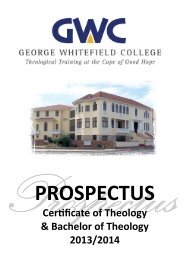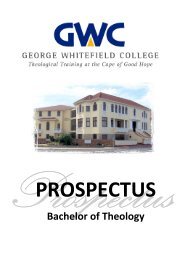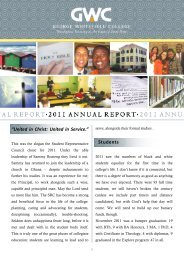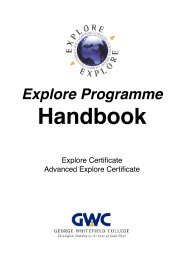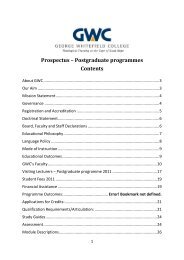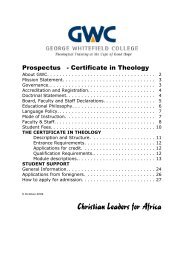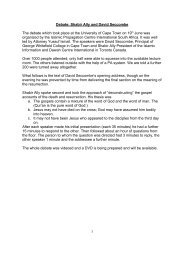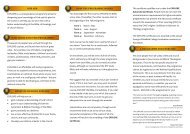Prospectus Bachelor of Theology Christian Leaders for Africa
Prospectus Bachelor of Theology Christian Leaders for Africa
Prospectus Bachelor of Theology Christian Leaders for Africa
Create successful ePaper yourself
Turn your PDF publications into a flip-book with our unique Google optimized e-Paper software.
will trace the indications <strong>of</strong> the saving work <strong>of</strong> Christ through the Old Testament to their fulfilment and further explication in the<br />
New Testament, and look at how this doctrine has been understood through the history <strong>of</strong> the <strong>Christian</strong> Church.<br />
Learning Outcomes:<br />
At the end <strong>of</strong> this module you should be able to:<br />
• explain the Bible’s teaching on the Person <strong>of</strong> Jesus Christ and be able to present the related doctrines clearly on the<br />
basis <strong>of</strong> the New Testament.<br />
• articulate and defend the Biblical doctrine <strong>of</strong> the Incarnation (the nature <strong>of</strong> Christ).<br />
• articulate the theological differences underlying the disputes concerning these doctrines in the history <strong>of</strong> <strong>Christian</strong><br />
thought.<br />
• show how the Old Testament really does <strong>for</strong>eshadow Christ<br />
• explain the New Testament’s teaching about the work <strong>of</strong> Christ, especially its understanding <strong>of</strong> the atonement<br />
• explain how the teaching was received by <strong>Christian</strong>s down the ages<br />
• give a biblically-based evaluation <strong>of</strong> modern ideas about the atonement<br />
2.1.5 The Holy Spirit & Salvation<br />
Credits: 8<br />
Description:<br />
This module aims to introduce you to applied soteriology, starting with a brief overview <strong>of</strong> pneumatology. It includes a<br />
consideration <strong>of</strong> the concept <strong>of</strong> the ordo salutis, and covers the doctrines <strong>of</strong> the Holy Spirit, union with Christ, salvation, grace<br />
(including election), effectual calling, regeneration, conversion, repentance, faith, justification, adoption, sanctification,<br />
perseverance and glorification.<br />
Learning Outcomes:<br />
At the end <strong>of</strong> this course you should be able to:<br />
• describe the complex <strong>of</strong> theological issues related to applied soteriology, and demonstrate adequate knowledge <strong>of</strong><br />
its different components.<br />
• explain the intensely practical and devotional nature <strong>of</strong> the subject matter, and apply the theological truths to the<br />
<strong>Christian</strong> life.<br />
2.1.6 The Church & the Future<br />
Credits: 8<br />
Description:<br />
In this course you will first examine the biblical concept <strong>of</strong> the church, giving special attention to the practical outworking <strong>of</strong> this<br />
teaching in preparation <strong>for</strong> effective future ministry. We then turn to the question <strong>of</strong> the future, where we emphasize the<br />
centrality <strong>of</strong> Christ in eschatology and develop the implications <strong>of</strong> his kingship <strong>for</strong> understanding history and the future <strong>of</strong> the<br />
world and individual <strong>Christian</strong>s.<br />
Learning Outcomes:<br />
At the end <strong>of</strong> the course the you should be able to:<br />
• discuss the biblical concept <strong>of</strong> the church<br />
• elaborate what it means <strong>for</strong> the church to be a family and a body<br />
• state the church’s mission<br />
• define the qualifications and role <strong>of</strong> church leadership as well as the role <strong>of</strong> women in the church<br />
• describe the shepherding work <strong>of</strong> the pastor<br />
• defend the need <strong>for</strong> church discipline and outline the process <strong>of</strong> church discipline.<br />
• explain what eschatology is.<br />
• articulate and defend the thesis that Christ is the centre <strong>of</strong> eschatology.<br />
• define the relation <strong>of</strong> eschatology to history and be able to discuss the progress <strong>of</strong> the gospel, the strengths and<br />
weaknesses <strong>of</strong> the various millennial views and the return <strong>of</strong> Christ.<br />
• outline what the Bible teaches concerning death, the intermediate state, the resurrection and new creation.<br />
• defend the biblical doctrine <strong>of</strong> judgment.<br />
15



